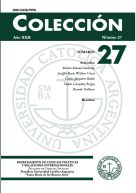Please use this identifier to cite or link to this item:
https://repositorio.uca.edu.ar/handle/123456789/6599| Título: | Catholic Worker Movement : un análisis desde la acción política no violenta y la lógica transnacional de los movimientos sociales | Autor: | Wilches Vacca, Jeniffer Rocío | Palabras clave: | CATHOLIC WORKER MOVEMENT; MOVIMIENTOS SOCIALES; ACCION POLITICA; SOCIEDAD CIVIL; CATOLICISMO; PACIFISMO; POLITICA | Fecha de publicación: | 2017 | Editorial: | Pontificia Universidad Católica Argentina. Facultad de Ciencias Sociales. Departamento de Ciencias Políticas y Relaciones Internacionales | Cita: | Wilches Vacca, J. R. (2017). Catholic Worker Movement : un análisis desde la acción política no violenta y la lógica transnacional de los movimientos sociales [en línea]. Colección, 22(27). Disponible en: https://repositorio.uca.edu.ar/handle/123456789/6599 | Resumen: | Resumen: El Catholic Worker Movement se ha caracterizado por enmarcarse en las dinámicas de movilización social y acción política no violenta, que respondían, desde su creación en 1933, a un conjunto de problemáticas sociales y económicas sobre las cuales la sociedad civil se interesó y dio inicio a su actividad en escenarios de la política doméstica de Estados Unidos. Pese a ser un movimiento que surgió en un contexto nacional con fundamentación religiosa, el CWM alcanzó el desarrollo de lógicas transnacionales que contribuyeron a la defensa de su causa y a la reivindicación de valores y principios que motivarían posteriormente a la búsqueda de recursos para reforzar su lucha. Así, el proceso de evolución del movimiento tomó dirección en torno a fenómenos como la difusión, la adquisición de repertorios de acción colectiva correspondientes a la no violencia, y al aprovechamiento de factores exógenos y endógenos representados en distintas formas de oportunidad política y capacidad organizativa. Abstract: The Catholic Worker Movement was characterized by framing in the dynamics of social mobilization and non-violent political action, responding, since its foundation in 1933, to a set of social and economic issues on which civil society was interested and began its activity in the United States domestic policy. Despite being a movement that arose in a national context with religious foundations, the CWM reached the development of transnational logics that contributed to the defense of their cause and the claim of values and principles that later moved to the search for resources to strengthen their struggle. Thus, the process of evolution of the movement took direction about phenomena such as diffusion, acquiring repertoires corresponding to non-violence collective action, and the use of exogenous and endogenous factors represented in various forms of political opportunities and organizational capacity. |
URI: | https://repositorio.uca.edu.ar/handle/123456789/6599 | ISSN: | 1850-003X (edición online) | Disciplina: | CIENCIA POLITICA | Derechos: | Acceso Abierto | Fuente: | Colección, 27, 2017 |
| Appears in Collections: | COL - 2017 Año XXII nro. 27 |
Files in This Item:
| File | Description | Size | Format | |
|---|---|---|---|---|
| catholic-worker-movement-wilches.pdf | 693,03 kB | Adobe PDF |  View/Open |
Page view(s)
125
checked on Apr 30, 2024
Download(s)
944
checked on Apr 30, 2024
Google ScholarTM
Check
This item is licensed under a Creative Commons License

